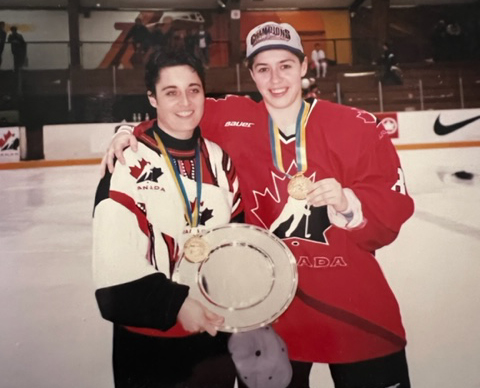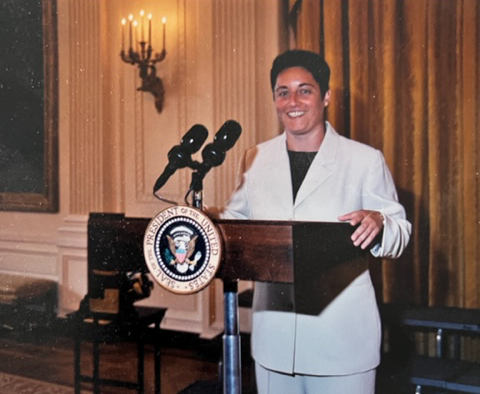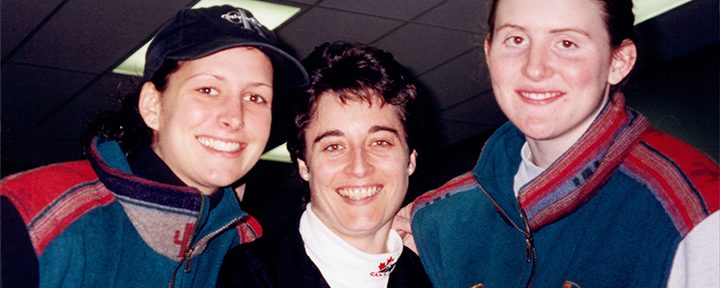Shannon Miller has been a trailblazer throughout her sporting life.
The 2021 Saskatchewan Sports Hall of Fame inductee not only broke new ground as a coach in women’s hockey, but she also did so while being openly gay. As we celebrate Pride Month, the Hall of Fame celebrates the successes and challenges overcome by our LGBTQ2S+ inductees like Miller.
After growing up playing hockey in Melfort, Miller was an inaugural member of the University of Saskatchewan’s women’s hockey program. She and two other women spent two years fighting red tape and discrimination to create a girls’ hockey league in Calgary. There, she also launched and directed the first high-performance training program for female hockey players at the Olympic Oval.
At the 1998 Nagano Winter Olympics, Miller was the head coach of the national team as women’s hockey made its Olympic debut. She was the only female head coach at the tournament.
“There was a lot of difficult stuff that happened that year. When you’re the first woman and you’re openly gay – I was just a target,” Miller said. “I felt like a deer running through the forest during hunting season.”

Shannon Miller at the 1997 IIHF World Championships with Nancy Drolet.
Miller had worked her way through the ranks to earn the national team job. She had helped coach Alberta to the first women’s hockey gold medal at the 1991 Canada Winter Games. She became an assistant coach for the Canadian women’s national team when they won the worlds in 1992 and 1994. Miller was named the head coach and she guided Canada to the 1997 IIHF World Championship in overtime against the United States.
Despite the on-ice success and a proven track record of building programs, it wasn’t smooth sailing.
“I felt like I was in a war against almost everybody. Especially the media attacking me. That really wore on me and my team,” Miller said.
“Every day I would put my shield of armour on and decide well I’m the first woman in the world to do this and I’m openly gay. And the media, they don’t like it. That was uphill and against the wind to say the very least. But I loved working with the players and I loved working with the staff. I mean when you coach it is so much about passion and vision and commitment to the process and commitment to each other and so no matter how difficult it was, it was still great.”
After losing the gold medal game to the Americans at the Olympics to claim silver, Miller moved on to build the women’s hockey program at the University of Minnesota-Duluth.
The Bulldogs won three of the first four NCAA national championships and ultimately won five under Miller.
“When I was there and had the support of the president and the athletic director before they both left, we were budgeted about middle-of-the-pack… but we were winning. And we were so proud of that. We were the little engine that could,” Miller said.

Shannon Miller speaking at White House.
That support for the program waned. Despite losing ground to their fellow Division I programs in terms of their resources, the Bulldogs remained competitive. In total, the team made 10 NCAA tournament appearances in her tenure.
Minnesota Duluth had won 12 of their previous 13 games heading into Christmas break and were ranked sixth in the NCAA when Miller was told her contract wasn’t being renewed. They said she could stay on for the rest of the season, but it would be her last. Miller said she just about fell out of her chair when she was told.
No coach in NCAA women’s hockey had more national titles (5) or Final Four wins (11) than Miller did at the time.
“I knew what was going on. I’m not stupid,” Miller said. “I had so much support, I immediately called my own press conference and said I was going to sue them.
“I sued them for Title IX sex discrimination and sexual orientation discrimination. And I won a Federal lawsuit. It was really difficult, but it was very important to do it.”
Miller’s dad died when she was 13, but she had strong family support, including both sets of grandparents. She described them as grounded, humble, and hard-working people.
“I will never forget the lessons they taught me,” she said of her grandparents who can be seen sitting directly behind the Canada bench during the 1998 Olympics. “I know those are my roots and that is my foundation. When you go back inside yourself and really remember who you are and where you came from, it’s not difficult to be strong and to rise up and to fight when you need to and to support others and lift others up.”
Miller lives in California with her partner Jen Banford and is back being involved in hockey as the vice president of branding and community relations for Acrisure Arena and the American Hockey League’s Coachella Valley Firebirds who are in the Calder Cup finals in their first season.
She remains as resilient and passionate about hockey as ever.
“I think I can credit the fact that I grew up in Melfort with that support,” she said. “My dad died. I had a difficult life anyway, I just got stronger and stronger as my life went on and I had no fear.
“When somebody wrongs you like that. The only right thing to do is to stand up and fight. And I did. And I won.”
